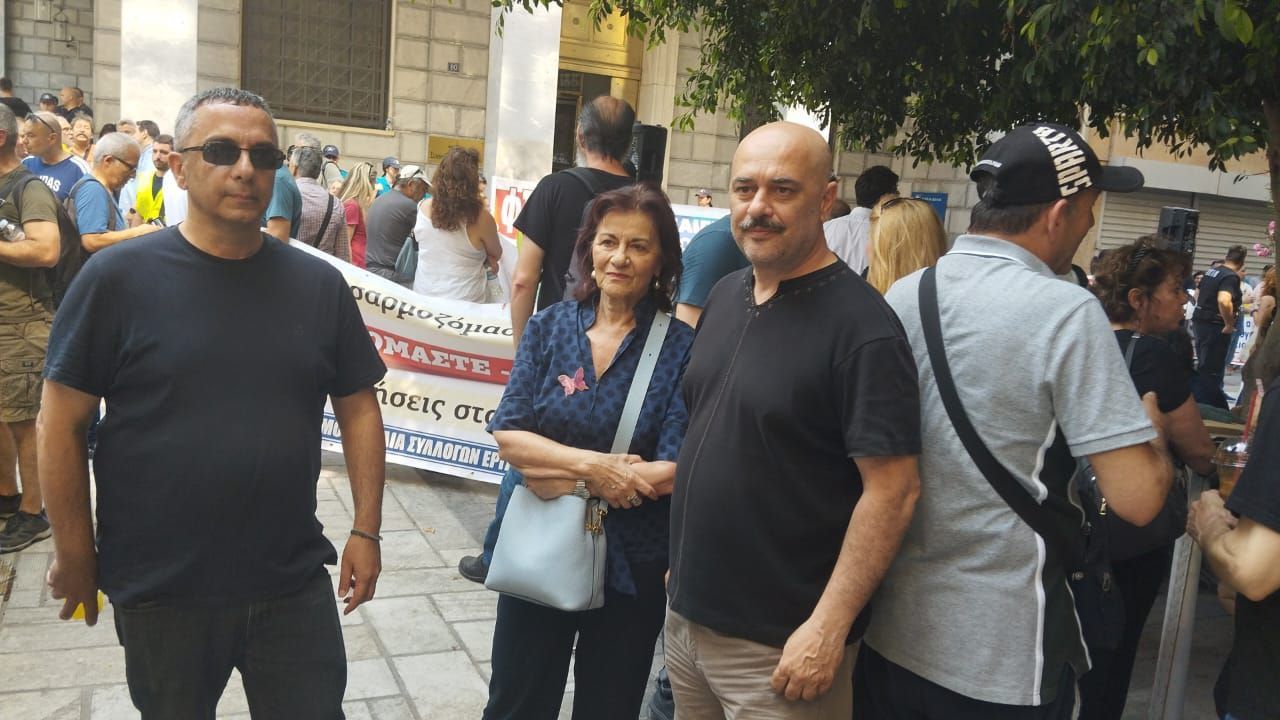An artistic « bequest » on the edge of darkness in the theater engine

A shady stitch unites the past with the present at the « Bequest », the new theatrical performance of the Group of Central Group that goes up every Saturday and Sunday until April 13 at the Eleni Georgakopoulou Theater by Engine.
It is a project that is woven by mystery yarns, family ties and underground conflicts, with the script signature of Thomas Kolliopoulos, Paraskevi Iziou, Frynis Agrafiotis, Eva Spanoudi, Christina Zeli and Eleni Pantazi Georgakopoulou. Inspired by the magnetic atmosphere and the dark elegance of the Park Chan-Guke cinematic world, the work attempts to convey to the stage the intensity and aesthetic fullness of the South Korean creator, through a purely Greek light.
The stock of the movie « Stoker » with underground intensity, implicit tensions and well -hidden family secrets is a source of inspiration for a new, dramatic autonomous work. The creators of the show mingle the aesthetics of that cinematic narrative with their own artistic look, utilizing elements of Greek cultural tradition: ancient Greek motifs, chorus parts, folk songs and mythological symbols.
The « bequest » unfolds in an old island mansion, where the walls whisper the truths that have been hidden for years. There, in a landscape of mourning and isolation, Venice Sarris is called upon to confront her memory, family silence and the burden of her inheritance. As her world cracks, another path unfolds, that of self -knowledge and personal freedom.
The actors Lambrini Giotis, Francis Cretan, Angeliki Kakoutis, Yiannis Koukouves, Panagiotis Pantelaios, Ireilonas Dimitrakopoulou, Giorgis Tokatlioglou, Michaela Micopoulou, Nikos Limnos Kangelaris, Eleni Davradou, Anna Vassalou, Aphrodite Tsatsi, Yiannis Kardoulis, Vassilis Grigoriadis and Maritina Ioannou.
In the hope of creating a universe where theater and cinema are intertwined, they all call the themes to be left to the vortex of this story. Their « bequest » does not ask for answers, only attention. On this occasion, « The News » talked with director Eleni Georgakopoulou about the show, the memory, the amateur theater and the art as a bequest.
How was the idea for the « bequest » born?
The « bequest » was born through the need to combine the aesthetics of Park Chan-Guk with our own cultural identity. The world of Park, with its intense narrative twists and darkens, was a compass for us. « Stoker », especially with its atmospheric intensity and underground family secrets, gave us the first trigger. From there he began a route to something purely Greek, but global to his theme.
Why did you choose the world of Park Chan-Wick as a starting point of the show?
Our love for the particular director and the awe we felt by watching the Stoker led us to create our own myth. Its influence runs through the show, but the end result is our absolute: a Greek -rooted Greek narrative, enriched by cinematic rhythm and theatrical freedom.
In the show there are ancient Greek motifs and elements from folk music. How do they « chat » with the dark aesthetics of the work?
For me, this conversation was almost self -evident. Clytemnestra, Medea, Hecabi – tragic, wounded, dark – talk directly with today’s women. So are the heroes of our folk music: Constantine’s wife or Mariora. All dressed in black, with a voice full of complaints and memory. The world of our work is a mirror of these archetypes.
Dance, inspired by ancient drama, what role does it play in the work?
The « whispers » act as intangible creatures that, sometimes singing, sometimes playing music, become the dance of the show. They comment, foreshadow, sometimes direct the action. It is the shadows of memory, the voices of the untold, the ones who know what the heroes do not dare to say.
What were the biggest challenges you faced as a director of this show?
The challenge was the orchestration: the harmonious coexistence of actors, dancers, singers, musicians and improvisors. All of these « carriers » of the narrative had to coordinate as a single breath. Not only to play, but to coexist with the aim of revealing the story – even when they do not use words.
Is there a personal item you put in the bequest?
Too much. From tables of my father’s, to books that marked me and clothes with emotional load. All of this, distinctive in the action, act as personal fingerprints. They are not just references – they are signs of memory chatting with the plot.
What do you hope the viewer will take with him by leaving the room?
To feel that he saw something decent. That we respected his time. And – if I can hope for something yet – to deal with him for a while, in a conversation with friends or inside, and want to interpret it in his own way.
After all, what is the most inherited in the project? Secrets, silences or guilt?
The guilt. These are the invisible load that passes from generation to generation. Silence and secrets nourish them, but they are the ones that haunt the heroes. What has never been said becomes the heaviest bequest.
The project speaks of memory and identity. Can we ever « inherit » ourselves?
I think this is the most difficult of all. Our ourselves are not given us ready; we must conquer it. To distinguish what is ours and what was imposed. The legacy of the self requires effort, awareness and often, pain.
Venice loses her father and finds a new truth. How often has something to die within us to find something true?
Almost always. The death of a piece of ours – an illusion, a relationship, an old identity – is essential for something authentic. The loss becomes a passage, the destruction leads to a regeneration.
A project for loss may not be a memory project. The « bequest » is a personal tribute, dedicated to my father who has dementia. It’s a way to find him again through fiction, to talk to him where he can’t answer, to illuminate the shadows he left behind. But to do this, something had to « die » inside me first: the way I was used to it. Only through this gap could something new, something of mine be created. This may be the essence of memory in the end: to turn the absence of history. And maybe this is the real bequest.
How did the centrifugal team start and what keeps you united?
The « centrifugal » was born of our need to express ourselves out of forms and schools. We are people from different worlds we met in art. We are united by the passion, the confidence and the feeling that every rehearsal is a true human encounter.
What are the greatest conveniences and difficulties when you do theater without being your « normal work »?
The convenience is that you have the freedom to experiment without the stress of the professional framework. Difficulty is time: rehearsals are done after work, often fatigue, but there is magic. It’s something you choose, because you need it.
How did the Meliritos Cultural Association support this production?
It was the foundation stone. It offered us a housing, technical means and, above all, trust. Thanks to Meliritus, we were able to create without the stress of « how » – only with the concern of « what ».
Is art a kind of bequest?
Undoubtedly. Art is a way to say, « I was here too. » It is a whisper that crosses time, carrying pieces of soul, season and collective memory. It is the most valuable bequest, because it has no material form – only substance.







